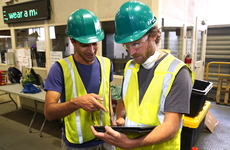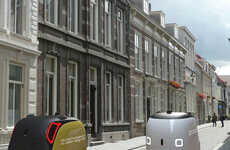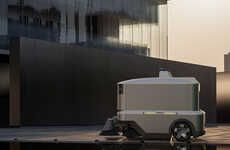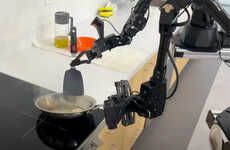
The ROAR Project is Engineered to Collect Garbage Efficiently
Michael Hemsworth — February 25, 2016 — Tech
References: news.psu.edu & damngeeky
A project created in partnership between three universities (Chalmers University of Technology, Mälardalen University and Penn State University), the Volvo Group and waste recycling brand Renova, the ROAR Project has engineered a robot that can collect garbage.
The impressive robot of the ROAR Project -- which stands for Robot-based Autonomous Refuse handling -- is designed to scan neighborhoods for garbage cans and collect accordingly.
The robot uses a drone to scan the surroundings to map a route to and from garbage cans; if unexpected obstacles are detected, the robot can either avoid or stop. The technology could make garbage collection in the future more efficient and less human-driven to help enable infrastructure to operate in a smoother manner.
The impressive robot of the ROAR Project -- which stands for Robot-based Autonomous Refuse handling -- is designed to scan neighborhoods for garbage cans and collect accordingly.
The robot uses a drone to scan the surroundings to map a route to and from garbage cans; if unexpected obstacles are detected, the robot can either avoid or stop. The technology could make garbage collection in the future more efficient and less human-driven to help enable infrastructure to operate in a smoother manner.
Trend Themes
1. Garbage-collecting Robots - Robots designed to collect garbage using drone technology and autonomous route-mapping may disrupt the waste management industry with more efficient and less human-driven waste collection.
2. Autonomous Waste Management - The use of autonomous technology in waste management could revolutionize the entire industry, offering increased efficiency, reduced costs, and improved safety while minimizing the need for human intervention.
3. Drone-assisted Waste Collection - As drone technology continues to develop, drone-assisted waste collection could become a major trend in the waste management industry, streamlining operations and increasing efficiency while reducing costs and environmental impacts.
Industry Implications
1. Waste Management - The use of robot-based autonomous refuse handling technology like the ROAR Project could disrupt the waste management industry, making garbage collection more efficient, safe and cost-effective.
2. Robotics - The development of garbage-collecting robots and autonomous waste management technology presents growth opportunities for robotics companies and could lead to more widespread adoption of similar technologies in industries beyond waste management.
3. Transportation - The use of autonomous technology in waste collection could disrupt the transportation industry, reducing the need for human-operated garbage trucks and opening up new opportunities for innovation in transportation technology.
1.7
Score
Popularity
Activity
Freshness























